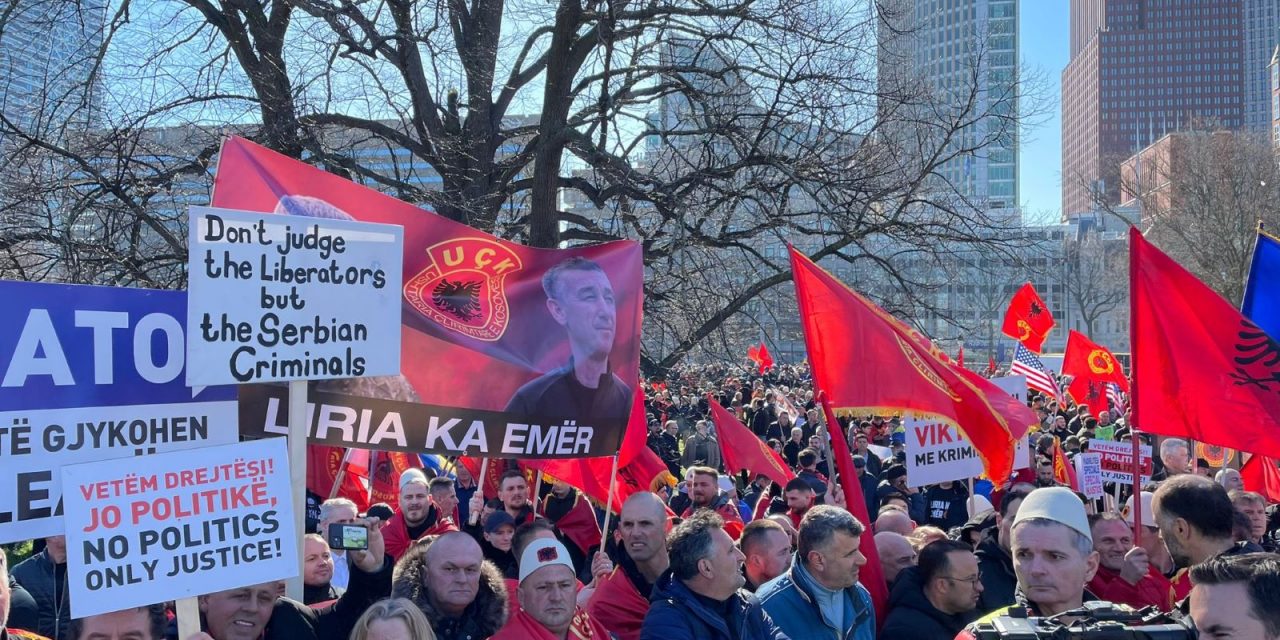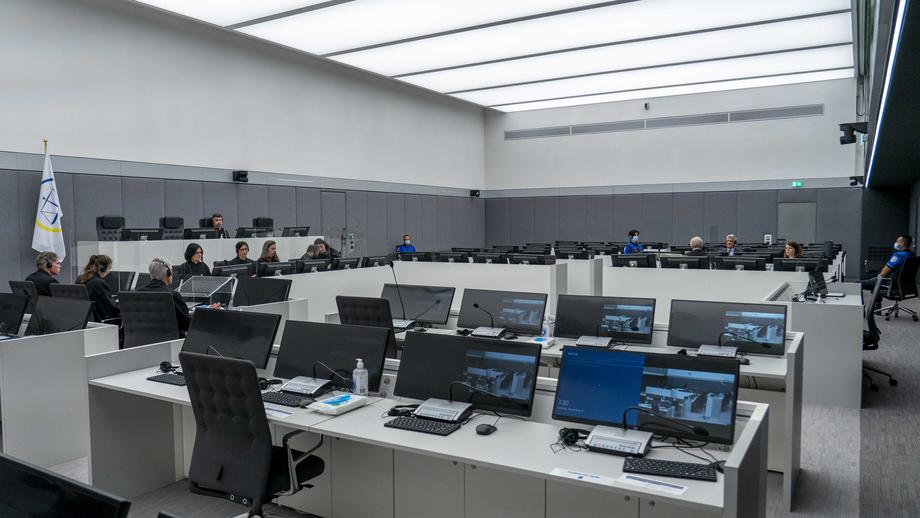In the first year of the trial of Kosovo’s former President Hashim Thaci and three co-defendants, the Hague war crimes court has heard testimony about murder and torture, but many sessions have been held behind closed doors.
The day before the April 3 anniversary of the start of the war crimes and crimes against humanity trial of four former Kosovo Liberation Army, KLA leaders, including Kosovo’s ex-President Hashim Thaci, the proceedings continued as they have done for a lot of the trial – in a closed session, with no press or public access.
The 54th witness in the trial at the Kosovo Specialist Chambers in The Hague mainly testified in private, as 31 others have done.
Around 60 per cent of the 54 prosecution witnesses testified in mainly closed sessions during the first year of the trial. In the first months of 2024, of the 15 prosecution witnesses who testified, 11 were not heard by the public.
This creates the perceived problem of a lack of transparency, said Amer Alija, a lawyer at the Humanitarian Law Centre Kosovo.
Alija told BIRN that “bearing in mind that this trial is monitored by journalists and monitors, we hear a lot of criticism about the closed sessions because the public wants to know what the witnesses will testify about”.
The court has been keen to ensure the safety of protected witnesses after previous incidents of witness-tampering at other KLA-related trials at the Yugoslav war crimes tribunal in The Hague. Alija noted that “the trial panel has to decide between transparency and the security of the witnesses, and security always comes first”.
The perceived lack of transparency has nurtured mistrust of the proceedings among Kosovo Albanians. The so-called ‘Special Court’ is highly unpopular in Kosovo, where it is seen as an attempt to tarnish the KLA’s just war for freedom from Serbian repression.
On November 7, 2023, the judges issued an oral order aimed at ensuring greater publicity for the proceedings. It was a follow-up to a previous order instructing the prosecution and defence to try to make the proceedings more public “in view of the number of private or closed sessions”.
When asking for a protected witness’ testimony or confidential information to be redacted from publicly-available documents, the prosecution and defence “should account for the need to ensure the greatest amount of publicity, while also ensuring the effective protection of those who have been granted protective measures”, a subsequent press briefing from the court said.
It remains to be seen if this will make much difference in the second year of what looks set to be a lengthy trial.
Witness intimidation charges

Protesters in front of the court in The Hague express their anger about the trial of the former guerrilla leaders they described as “liberators”, April 3, 2023. Photo: BIRN/Valdet Salihi.
The four defendants in the trial – Thaci, Kadri Veseli, Jakup Krasniqi and Rexhep Selimi – are accused of having individual and command responsibility for crimes committed against prisoners held at KLA detention facilities in Kosovo and neighbouring Albania, including 102 murders.
The crimes were allegedly committed between at least March 1998 and September 1999, during and just after the war with Serbian forces. The defendants have pleaded not guilty to all charges.
Despite attempts to shield witnesses, intimidation has been a constant problem for the court. The Specialist Chambers has already convicted the leader of the KLA War Veterans’ Organisation, Hysni Gucati, and his deputy Nasim Haradinaj of obstruction of justice and intimidation of witnesses.
A pre-trial judge has also decided to send another witness intimidation case against former KLA members for trial. The accused – Sabit Januzi, Ismet Bahtijari and Haxhi Shala – deny trying to pressurise witnesses into not giving or withdrawing evidence.
The prosecution has further accused Thaci and co-defendants Veseli and Selimi of attempting to interfere with witnesses, which they denied. The allegations led to the imposition of restrictions on their visits and phone calls, which Kosovo’s Council for the Defence of Human Rights and Freedoms described as an attempt to “penalise” the defendants, showing a disregard for their human rights.
Organised force or decentralised militia?

The courtroom at the Kosovo Specialist Chambers in The Hague during a hearing in the case of Hashim Thaci. Photo: EPA-EFE/JERRY LAMPEN.
In the trial so far, the defence has been trying to prove the Kosovo Liberation Army didn’t have a proper army command structure, so the defendants couldn’t have been responsible for any crimes committed by lower-ranking fighters.
Former British Army officer Douglas Young told the court last September that the KLA was not organised like a standard army although it attempted to look like a structured military “to present the KLA in the best possible way to international organisations”. However, in reality it did not have a modern army structure or hierarchy, Young said.
Similarly, Rrustem Mustafa, former commander of KLA’s wartime Llap Operational Zone, also known by the nom de guerre Remi, told the court in July 2023 that the guerrilla force mainly functioned from the bottom up and did not have a fully-established chain of command.
“We did not reach the point of having an army that would have been led by the general staff,” Mustafa claimed, adding that “the war ended before the general staff acquired the level of a respected hierarchy needed to issue orders to the zone commanders”.
However, Francis Ledwidge, a British intelligence service officer who was part of the OSCE mission in Kosovo during the war in 1998 and focused on investigating missing persons, mainly in Rahovec/Orahovac, told the court in July last year that despite disagreements within the KLA, the guerrilla force showed “a level of organisation and coordination” when seizing civilians.‘
Ledwidge said that “the level of the organisation and coordination of kidnapping of civilians in Rahovec and the region speaks to me of a level of organisation and not a mess”.
Meanwhile a series of prosecution witnesses testified in closed sessions about alleged abductions and torture by KLA members, according to prosecution summaries of their testimony. The victims of these crimes were either the witnesses themselves or their relatives, who in some cases disappeared completely without their bodies ever being found.
In August, witness Dragica Bozanic testified that her husband and son were taken away by the KLA and never seen again.
“I lost half of my heart when my 16-year-old son was snatched from my hands… and I will never stop until I discover the truth,” Bozanic, a Serb who was originally from Kosovo but has not lived there since the war, told the court.
The trial continues.





